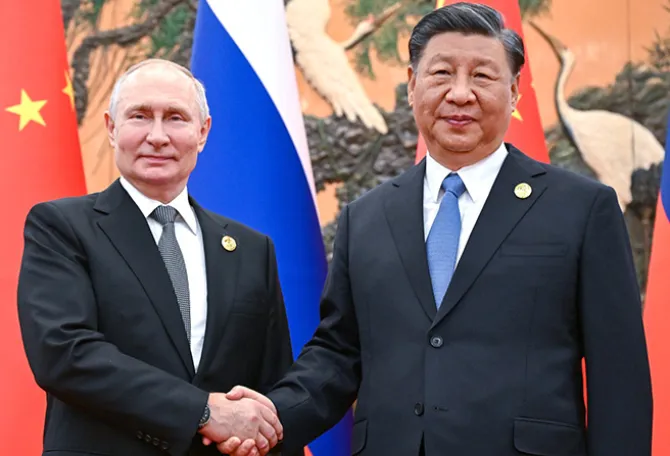-
CENTRES
Progammes & Centres
Location
Vladimir Putin and Xi Jinping have not really been travelling a lot since the Covid pandemic but they manage to find time for each other amidst the fragmentation of the global order

At last week’s Belt and Road Initiative forum hosted by China to mark 10 years of the pet initiative of the Chinese president, Xi Jinping, the star attraction was the Russian president, Vladimir Putin. Though Moscow is not an official signatory to the BRI, the bonhomie between the two leading autocrats of the world was a reminder that their ties are getting solidified as the Ukraine war drags on and the fault lines between the West and China and Russia become sharper. Interestingly, it is China that is defining the terms of its engagement with Russia.
Just before its invasion of Ukraine, the two nations had declared a ‘no limits friendship’ during Putin’s visit to Beijing for the winter Olympics. Since then, spurred by the backlash generated in the West because of the Ukraine war and Putin’s growing dependence on Beijing’s support, the two nations have continued to come closer. This convergence is also reflected in their position on the latest crisis in the Middle East where they have called for an end to violence and the need to implement a two-state solution, studiously avoiding mention of the terrorist attack by Hamas. Russia and China have strong ties with Israel but in order to challenge the West that has supported Israel, Moscow and Beijing have taken an approach that seemingly binds them closer to the Arab world.
Putin and Xi have not really been travelling a lot since the Covid pandemic but they manage to find time for each other amidst the fragmentation of the global order.
Putin finding time to visit China for the BRI forum was a statement of the importance that Moscow accords to China in its foreign policy calculus. Putin and Xi have not really been travelling a lot since the Covid pandemic but they manage to find time for each other amidst the fragmentation of the global order.
If the war in Ukraine has exposed the economic and military vulnerabilities of Putin’s Russia, the economic challenges facing China have also dismantled the notion of Xi being an efficient administrator. The two leaders remain vulnerable at home and abroad.
Economic relations between Russia and China have been galvanised by the Ukraine crisis, with Russia now a significant export market for China even as the West is having a relook at its economic engagement with Beijing. Bilateral trade between Russia and China rose to $21.18 billion in September with Putin expecting it to reach a dramatic $200 billion by the end of the year. As China looks for new markets, Russia is being viewed as the next trade and commerce frontier by the mandarins of the Chinese Communist Party, partly to adjust to the negative headwinds from the West and partly to manage domestic economic turbulence. This suits Putin well who is using this boisterous economic embrace by the world’s leading economic power to underscore his own credentials as a global player.
Russia and China also remain the two outliers in not accepting the terms and the logic of the Indo-Pacific.
Consequently, the world is witnessing an unprecedented level of coordination between Moscow and Beijing on global affairs. This is reflected in their intervention in the Middle East, to their moves targeting Japan by imposing restrictions on the import of fish and seafood from that country after the release of treated radioactive water from the Fukushima nuclear power plant. Russia and China also remain the two outliers in not accepting the terms and the logic of the Indo-Pacific. They are working together in the waters of the Arctic as well as in various multilateral and regional platforms. Though China has so far been careful not to be been seen as endorsing Russian actions against Ukraine, it has been providing critical civilian and military goods that have sustained Russian economy and war operations. Russia has had to turn to Iran and North Korea for drones and artillery shells but it is China’s role that has been critical in ensuring that Moscow remains capable of challenging West-supported Ukraine.
India’s ties with Russia will be tested as the Moscow-Beijing axis continues to evolve. New Delhi has managed to keep its relations with Russia on an even keel despite several challenges since the end of the Cold War. But now a new era is beginning. As Russia finds sustenance in a robust embrace of China, India will have to ensure that it is not left off balance.
This commentary originally appeared in Tele Graph.
The views expressed above belong to the author(s). ORF research and analyses now available on Telegram! Click here to access our curated content — blogs, longforms and interviews.

Professor Harsh V. Pant is Vice President – Studies and Foreign Policy at Observer Research Foundation, New Delhi. He is a Professor of International Relations ...
Read More +